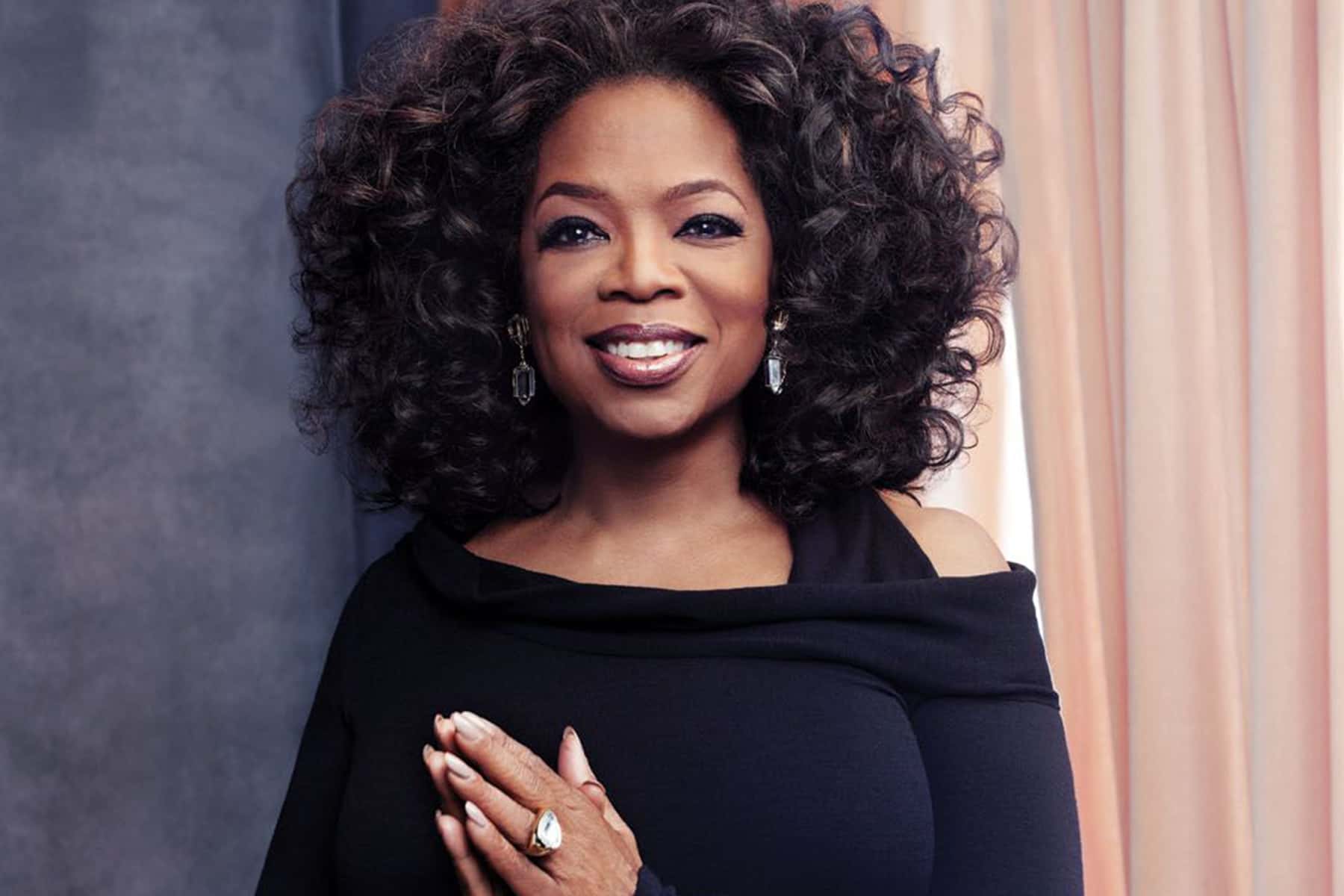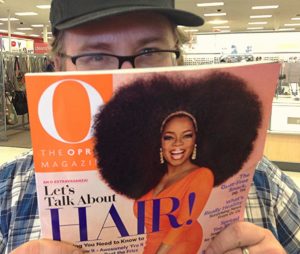
The Oprah Winfrey Show was an American Institution for 25 years. It was broadcasted in 110 countries around the world. An estimated 30 million Americans tuned in each day. These people invited Oprah Winfrey into their living rooms every afternoon to enlighten their minds and inspire their hearts. Despite competition from dozens of other talk shows over the years, The Oprah Winfrey Show held the number-one spot in daytime television for 18 years. Actress Julia Roberts describes Oprah as “a girlfriend to the world.” Her popularity transcended all ethnic, gender, age, and socio-economic barriers. On one of her final episodes in 2011, President Barack Obama appeared and said, “You’ve got a big heart, and you share it with people. Nobody knows how to connect better than you do. We are blessed and grateful to have you in our lives.”
Oprah Winfrey is truly gifted in her ability to connect with other people. John Grace, a marketing expert, put it like this: “Her audience has come to believe Oprah is real and she is telling the truth.” Winfrey worked hard to earn this admiration. Her willingness to talk about the struggles she has faced throughout her life allows her to connect with ordinary people on an emotional level. Winfrey describes herself by saying, “I am a woman in progress. I’m just trying like everyone else. When viewers hear Winfrey talk about overcoming her own problems and conquering her inner demons, they are inspired to believe they can do the same thing.
Winfrey is more than just a talk show host. She is an actress, producer, author, and accomplished businesswoman. As of 2016, her net worth was rated at $3.1 billion, making her the second wealthiest self-made woman in the United States and the first African-American woman to billionaire. Oprah is by far the richest person selected for this book, but she also had the poorest upbringing. While the story of her success is remarkable, it is even more remarkable how she has used that success to make the world a better place. Winfrey’s compassionate nature leads her to be generous with her time and money. According to Business Week, Winfrey has donated more than $400 million to worthy causes. She says:
“My mission is to use this position, power, and money to create opportunities for other people.” She remembers how opportunities were not so plentiful when she was growing up.
Oprah was born on January 29, 1954, in Kosciusko, Mississippi. Her mother intended to name her after Orpah, a woman mentioned in the Bible, but the name was misspelled on her birth certificate. Oprah’s mother, Vernita, and father, Vernon, barely knew each other. Oprah characterizes their relationship as a “one-day fling under an oak tree.” In fact, Vernita did not tell Vernon about her pregnancy until after Oprah was born. His notification came in the form of a birth announcement that was accompanied by a request for baby clothes.
Vernita had little money, so she moved in with her parents to raise Oprah. The young girl’s formative years were spent on a tiny farm that had no electricity or indoor plumbing. To say that she was “dirt poor” is not an exaggeration, since the floors in her grandparents’ house were made of just that—dirt. When Oprah was still a toddler, her mother left Mississippi to pursue a better-paying job in Milwaukee, Wisconsin. For the first six years of her life, Oprah was raised under the strict tutelage of her maternal grandparents. She quickly blossomed into an excellent student and an impressive public speaker. When she was just three, she recited a passage from the Bible in front of the entire congregation of her church. She loved to read and used books to dream about life outside of segregated Mississippi. Oprah was an overachiever in the classroom, completing homework assignments early and doing extra credit to earn high grades.
Soon after her sixth birthday, Oprah joined her mother in Milwaukee. She lost the supportive home life she had known with her grandparents. Vernita worked long hours cleaning houses, which left Oprah unsupervised much of the time. At the age of nine, Oprah was sexually abused by an older cousin. Just a few years later, she was molested by a family friend and an uncle. Like many young victims of sexual assault, she did not tell anyone about the abuse until she was an adult. These traumatic events sent Oprah’s life spiraling out of control. She became rebellious, running away from home, stealing money, and having sex with older boys. At the age of 13, Oprah became pregnant but did not tell anyone.
Vernita realized that she could not provide a proper home life for Oprah and asked Vernon to take her in. Oprah’s father accepted the responsibility of caring for his teenage daughter, and she moved to Nashville, Tennessee, to live with him and his new wife. To conceal her pregnancy from her father, Oprah wore bulky sweaters and kept her distance. When she was seven months pregnant, Oprah was sent to a pediatrician because her “ankles were swollen.” The pediatrician confirmed the pregnancy and told Oprah that she must tell her father the truth. Years later, Oprah recounted the details to Barbara Walters. “The stress of having to tell my father sent me into labor,” she said. “I delivered that child that day, and the child never left the hospital. It died.” In a heart-to-heart talk with his daughter after the birth, Vernon told Oprah, “This is your second chance. You should make good on it.”
Vernon Winfrey became the moral compass in his daughter’s life, providing consistent structure and discipline. In addition to her schoolwork, she was required to read more and learn 20 new vocabulary words per week. “When my father took me in, it changed the course of my life,” Winfrey later said. “He saved me.” Her father might have provided the direction, but Oprah realized on her own that a positive attitude and effort could take her a long way in life. She once again began earning excellent grades. When she was 16, a local radio station agreed to pay her $100 a week to read the news on the air. The following year, she graduated from high school and was awarded a four-year academic scholarship to Tennessee State University. That same year, she was crowned Miss Black Tennessee.
Winfrey had talent as a broadcast journalist and it was just a matter of time before someone noticed. However, even she couldn’t have imagined that her big break would come so soon. While still in college, Winfrey was offered the opportunity to anchor the news at a Nashville television station. She eagerly accepted, and at the young age of 19, she became the first African-American female news anchor in Nashville.
A few years later, in 1976, a much larger TV station in Baltimore recruited Winfrey to anchor their evening newscast. Her star was on the rise. There were just a few problems, though. The station manager in Baltimore told her that her hair was too thick, her eyes were too far apart, and her nose was too wide. In an attempt to “fix” some of these problems, she was sent to a prestigious New York salon for a makeover and a perm. The results were disastrous. The chemicals used on her hair made it fall out. Looking back on that experience, she said, “You come to learn a lot about yourself when you’re bald and black and an anchorwoman in Baltimore.”
To make matters worse, Winfrey was demoted for getting too emotionally involved in her stories. She had a habit of crying when she covered heartbreaking stories. She was reassigned to co-host a morning show called People Are Talking. As a serious newswoman, she was initially insulted by the offer to cover topics that she considered fluff. However, after the first show ended, she found herself thinking, “Thank God, I’ve found what I was meant to do. It’s like breathing to me.” The talk show format allowed Winfrey to be herself. While her laughter and tears once alienated the station’s news producers, the same expressions of emotion were now endearing her to the public. For the next seven years, people in the Baltimore area were talking about Oprah Winfrey.
In 1984 Winfrey was offered an opportunity to relocate to the windy city to host A.M. Chicago. The job represented a huge opportunity because Chicago was one of the largest broadcast markets in the country. However, this time she wanted to be sure the station did not intend to “fix” her. Before accepting the position, Winfrey had a serious conversation with Dennis Swanson, general manager of the ABC affiliate in Chicago. She told him, “You know I’m black and that’s not going to change, right?” Swanson responded with a grin, “I’m looking at you.” But she wanted more assurance. “I have a weight problem I’ve been fighting all my life,” she said. Swanson responded, “And so have I.” Winfrey’s new boss provided the affirmation she had been looking for since her career began. “You have a gift, young lady,” Swanson said. “So just go on the air and be yourself.”
Within a month, Winfrey’s ratings were higher than those of Phil Donahue, the man who had been on top of the talk show industry for years. The following year the show was renamed The Oprah Winfrey Show and syndicated across the United States. In a savvy business move, Winfrey took a risk and decided to buy the rights to her show. She started a company called Harpo Productions—Harpo is Oprah spelled backward—and built a $20 million production facility to house the show. Instead of receiving a regular paycheck, she would now be responsible for writing the checks, deciding the content of the show, and producing it. In other words, she was now responsible for her own destiny. If the show failed, she could lose everything, but if it succeeded, there was no limit to her success.
 In the 1990s, Harpo started small by initially producing made-for-television movies. A decade later, the company began publishing O Magazine, named for Oprah. The magazine enjoyed the most successful beginning ever in the magazine publishing industry and had approximately 2.5 million subscribers. Every edition of the monthly publication featured a glossy photo of Winfrey on the cover and was filled with inspirational and insightful articles that motivated people to improve their lives. Some would argue that her biggest business venture was starting her own cable network channel – OWN (Oprah Winfrey Network) in 2011.
In the 1990s, Harpo started small by initially producing made-for-television movies. A decade later, the company began publishing O Magazine, named for Oprah. The magazine enjoyed the most successful beginning ever in the magazine publishing industry and had approximately 2.5 million subscribers. Every edition of the monthly publication featured a glossy photo of Winfrey on the cover and was filled with inspirational and insightful articles that motivated people to improve their lives. Some would argue that her biggest business venture was starting her own cable network channel – OWN (Oprah Winfrey Network) in 2011.
While Winfrey prides herself on knowing how every penny of her company’s money is spent, she is generous with her own resources. She articulates her philosophy on giving by saying, “Everything you do in your life comes back to you. I call it divine reciprocity.” She remembers one particular event in her life that inspired this way of thinking. When she was 12, her mother told her that she could not afford to buy her a Christmas present. However, on Christmas Eve three nuns came to the family’s home to provide them with a turkey and a few toys to put under the tree. This compassionate act carried out by complete strangers now motivates Winfrey to put joy in the hearts of others.
Before Winfrey bought the rights to her TV show, several staff members requested raises from the previous management, only to be turned down. When she became CEO, she made sure every person on her staff received a Christmas bonus of $10,000. Once when she was on a movie set, she noted that while she and the other actors were treated to a lavish buffet every morning, the production staff brought fast food with them to the set. When Winfrey inquired about this discrepancy, she was told that the budget was too small to provide food for everyone. She promptly decided to use her own funds to provide food for the entire crew. When Winfrey is invited to the White House to meet with presidents and other prominent members of society, she makes sure to venture into the kitchen to thank the staff that prepared the meal. Not many celebrities accompany her when she makes that detour to the kitchen.
Winfrey continues to donate more than 10 percent of her income to charity. In addition to many anonymous donations, she has established several foundations. The Oprah Winfrey Foundation, established in 1987, supports the education and empowerment of women, children, and families. Finally, inspired by the nuns who selflessly gave her Christmas presents so many years ago, Winfrey expanded her philanthropy through the Christmas Kindness South Africa initiative in 2002. She personally visited orphanages and rural schools in South Africa, providing gifts for 50,000 impoverished She also donated money to build schools and libraries in this impoverished region of the world. Winfrey is deeply committed to her foundations and the work they do around the world.
Closer to home, Winfrey participated in the Big Sisters program to mentor disadvantaged girls in the Chicago area. She invited the girls to her home for sleepovers, took them on field trips, and generously financed shopping sprees. The most important part of the job, however, was to be a role model. She tried to keep the girls on the straight and narrow. “When we talk about goals and they say they want Cadillacs, I say, ‘If you cannot talk correctly, if you cannot read or do math, if you become pregnant, if you drop out of school, you will never have a Cadillac, I guarantee it!’”
Winfrey also mentored a 13-year-old boy, Kalvin, from the housing projects of Chicago. Despite the overwhelming obstacles in his life, Winfrey was hopeful that Kalvin could accomplish great things. She personally tutored the boy, helped his mother obtain her GED, and moved the family into a safer home. Inspired by their turnaround, she started a program called Families for a Better Life and personally donated $6 million to get the organization off the ground.
 The Oprah Winfrey Show always had a different feel than most daytime talk shows. When the show debuted in the 1980s, Winfrey admits she was guilty of covering “trashy” issues like the other talk shows, but even then, she says she was not trying to surprise her guests or shock the audience. “From the beginning, my philosophy has been that people deserve to come and to leave my show with their dignity,” she explains. By the 1990s, Winfrey was tired of that type of show and disgusted with the talk show industry. In an interview, she tried to distance herself from the “trash pack” by explaining her philosophy on the subject. “A good talk show will stimulate thought, present new ideas, and maybe give you a sense of hope where there wasn’t any—a feeling of encouragement, enlightenment. Inspire you,” she said. Many fans believe it is this philosophy that has kept The Oprah Winfrey Show in the number-one slot for so many years.
The Oprah Winfrey Show always had a different feel than most daytime talk shows. When the show debuted in the 1980s, Winfrey admits she was guilty of covering “trashy” issues like the other talk shows, but even then, she says she was not trying to surprise her guests or shock the audience. “From the beginning, my philosophy has been that people deserve to come and to leave my show with their dignity,” she explains. By the 1990s, Winfrey was tired of that type of show and disgusted with the talk show industry. In an interview, she tried to distance herself from the “trash pack” by explaining her philosophy on the subject. “A good talk show will stimulate thought, present new ideas, and maybe give you a sense of hope where there wasn’t any—a feeling of encouragement, enlightenment. Inspire you,” she said. Many fans believe it is this philosophy that has kept The Oprah Winfrey Show in the number-one slot for so many years.
The theme for the show’s 2004–2005 season was “Wildest Dreams Come True.” Winfrey kicked off the season by giving away 276 cars to audience members. Everyone in the audience had been selected because they owned old, dilapidated cars and desperately needed new transportation. Winfrey arranged for Pontiac to donate the new cars and cover the cost of taxes for each one. When asked why she decided to give every member of her audience a new car, she replied, “Just because we can.”
Winfrey also has great compassion and respect for educators, believing that they often do not get the gratitude they deserve. One year she invited an audience of teachers to her annual “Favorite Things” show. She then showered them with dozens of gifts. Each of the schoolteachers walked away with new merchandise worth thousands of dollars.
While Winfrey is a compassionate woman, she also emphasizes the importance of personal responsibility in people’s lives. “My message is ‘You are responsible for your own life,” she said. “Don’t complain about what you don’t have. Use what you’ve got. To do less than your best is a sin.” She is happy to lend a helping hand to those who need it but expects those she helps to take positive steps to better their own lives as well.
Over the course of her own life, Winfrey has worked through many difficult issues, including sexual abuse, racial and gender discrimination, and low self-esteem. She also struggled for many years to control her weight. However, she never felt sorry for herself but instead has worked diligently to overcome these obstacles.
It might surprise you to learn how a woman with nearly unlimited wealth, power, and influence spends her time. Winfrey’s idea of fun is to curl up with a good book. She says, “Reading books is the single greatest pleasure I have.” It seems that her father’s directive to read more books when she was an adolescent had a profound influence on her life. She shares her love of reading with the world through her online book club. She said, “The best thing about it is the thousands of letters from people who haven’t picked up a book in 20 years.” Several times a year she devoted a show to her favorite books and introduced new authors.
Because of her overwhelming popularity, Winfrey has been forced to become more protective of her privacy over the years. She describes the price of fame this way: “You never, ever, ever have moments to yourself, and you’re always conscious that people are looking at you.” An audience member visiting Chicago for the first time asked Winfrey to recommend her favorite restaurant in the area. Surprisingly, she replied that she no longer goes out to eat, to avoid the scene that it would cause when people spotted her in public. Instead, she spends most of her free time at her secluded 160-acre farm in Indiana with her friend Gayle King or her long-time companion, Stedman Graham.
Graham, the CEO of a marketing company, is an independent businessman who writes inspirational and leadership books. Winfrey calls him “Steddy” because she says he is her rock. The two were engaged in 1993 but decided to postpone the wedding because the date coincided with the release of Winfrey’s autobiography. According to her, the subject has not come up since then. Still, their relationship remains strong. “Stedman and I have a great relationship that allows me to be me in the fullest sense,” she explains.”
Winfrey says that she is one of the most blessed people in the world because she is paid so handsomely to do a job she loves. She has the wisdom to know that wealth and privilege are accompanied by the responsibility to help others reach their full potential. To that end, she says, “I will continue to use my voice and my life as a catalyst for change, inspiring and encouraging people to help make a difference in the lives of others.” Her compassion for people leads her to encourage them to live their best life and to live it with passion.
Discussion Questions
- Describe the way Oprah grew up? What were some of the hardships she had to overcome?
- Oprah was not always successful in her television career. What were some of her early failures?
- List at least two ways that Oprah exhibited compassion during her career?
- Oprah admits that she is a workaholic and a perfectionist. How do we know this to be true?
- What inspires you about Oprah Winfrey and how can her life make you a better person?
